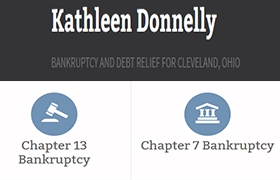Cleveland Reorganization Lawyer, Ohio
Sponsored Law Firm
-
 x
x

Click For More Info:
-
Law Office of Kathleen Donnelly
526 Superior Ave #1030 Cleveland, OH 44114» view mapChapter 7, Chapter 13, Free Evaluations Need Debt Relief? Contact Me Today
There is hope for debt relief. At the Cleveland, Ohio, law office of Kathleen Donnelly, we help people like you to escape from under mountains of debt.
800-413-4100
Nancy Anne Valentine
Litigation, Transactions, Reorganization, Credit & Debt
Status: In Good Standing Licensed: 26 Years
Jozeff Wayne Gebolys
Litigation, Business, Reorganization, Juvenile Law
Status: In Good Standing Licensed: 9 Years
Ashley Bailes
Litigation, Reorganization, Bankruptcy & Debt
Status: In Good Standing Licensed: 7 Years
Shannon Marie Byrne
Transactions, Reorganization, Credit & Debt, Bankruptcy & Debt
Status: In Good Standing Licensed: 13 Years
Malvin Elwood Bank
International Tax, Estate Planning, Reorganization
Status: Inactive Licensed: 67 Years
Sarah Elizabeth Whiteman
Private Schools, Litigation, Internet, Antitrust, Reorganization
Status: In Good Standing Licensed: 9 Years
Allison Haugen
Private Schools, Litigation, Internet, Antitrust, Reorganization
Status: In Good Standing Licensed: 9 Years
Vanessa Gregory Vacante
Private Schools, Litigation, Internet, Reorganization, Employment
Status: In Good Standing Licensed: 10 Years

 Kathleen Donnelly Cleveland, Ohio
Kathleen Donnelly Cleveland, Ohio About UsKathleen Donnelly
About UsKathleen Donnelly Contact UsCall or Email Right Now
Contact UsCall or Email Right Now
